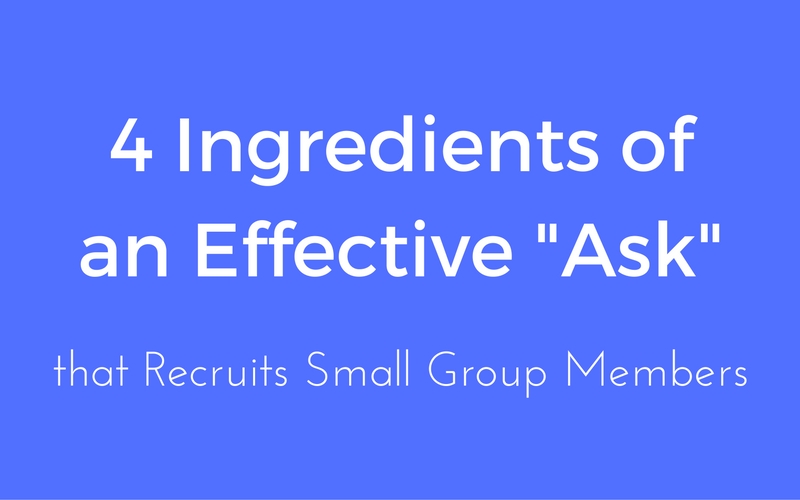4 Ingredients of an Effective “Ask” (that Recruits Small Group Members)
 I'm regularly asked, "What is the best way to get the most people involved in our upcoming church-wide campaign?"
I'm regularly asked, "What is the best way to get the most people involved in our upcoming church-wide campaign?"
To answer that question, I wrote what became one of my most popular articles, 5 Keys to Getting Everyone Involved in a Church-Wide Campaign. I won't go into all 5 keys here, but I will remind you that getting everyone involved begins with your senior pastor.
Here's an excerpt from the article:
Getting everyone involved begins with your senior pastor. There’s no getting around this. Connecting everyone involves your senior pastor talking about the importance of being in a group every week. When you’re launching a church-wide campaign, be sure your pastor is emphasizing the importance of “being part of a group that’s using the curriculum that goes along with the weekend message.”
See also Your Senior Pastor as Small Group Champion Leads to a Church OF Groups
Getting everyone involved begins with your senior pastor. And that begs the question, "What, exactly, does my senior pastor need to say to be most effective?"
What, exactly, does my senior pastor need to say to be most effective? Share on X
Making the small group ask really involves two separate asks:
- The HOST Ask (where you'll be recruiting people who will host a group). I've provided very specific instructions in this article: How to Make the HOST Ask (the 2012 version). I also detailed a very important innovation in this ask in this article: Saddleback Changed the Church-Wide Campaign Game...Again.
- The Member Ask: (where you'll be recruiting people to join a small group.
Here are what I think are the key ingredients of an effective "ask" that recruits small group members.
4 Ingredients of an Effective "Ask" (that recruits small group members):
There are 4 very important ingredients:
1. Appropriate Urgency
If there is ever a place for passion it is in this ask. An effective ask always conveys a sense of urgency. There may be a place for blandly reporting the facts. It is not here. Certainly, there are senior pastors whose speaking style is even and rarely passionate. This is the moment for them to work to communicate urgency. See also, What's Your Urgency Level for Unconnected People?
2. Skillful Placement
The best time for the senior pastor to make the ask is during the sermon. Announcements and pre-service slides are helpful, but if you want to leverage the influence of the most influential person in your congregation, the best time to make the ask is in the sermon. It also matters where the ask is placed within the sermon. In my opinion, the best time for the ask to happen is when the sermon naturally leads to an opportunity for a response. Obviously, some sermon topics lend themselves more naturally to an opportunity for this kind of response (and ultimately, this should be a factor in the selection of topics for the weeks leading up to a church-wide campaign).
If you want to leverage the influence of the most influential person in your congregation, the best time to make the ask is in the sermon. Share on X
3. Visionary Language
Again, there may be times for bland reporting of the facts and details (when and where the small group connection is, childcare is offered, how to pick up your study guide, etc.). The ask is NOT the time for facts! The ask, made during the message, is the single best opportunity to cast vision about the potential impact of joining a small group.
The ask is NOT the time for facts! The ask, made during the message, is the single best opportunity to cast vision about the potential impact of joining a small group. Share on X
4. Action Step
When you make the ask, always ask for a response. "Fill out this card (hold it up) and drop it in the offering in a few minutes." Too often, senior pastors include the other three ingredients and neglect asking for a response.
Very Important:
You must make the ask several weeks in a row. Don't miss this. Unconnected people are infrequent attenders. They rarely attend two weeks in a row. See also, Why You Must Make the HOST Ask Three Weeks in a Row.
You must make the ask several weeks in a row. Don't miss this. Unconnected people are infrequent attenders. They rarely attend two weeks in a row. Share on X
Here is an example ask:
"I believe the message series we're launching on September 18th is going to have a powerful impact on us. In fact, I believe 10 years from now we will still be talking about what happened in life after life as a result of this message series." Note: I often tell senior pastors that the true measure of the potential significance of a message series is whether you can authentically make this statement.
As your pastor, I want to challenge you to make three important commitments as we begin this series.
First, I want to challenge you to be here every week for this series. If you have to miss, be sure and watch it online.
Second, I want to challenge you to be part of a small group that is using the study that goes along with what I'll be preaching. It's a 7 week commitment. Being part of a small group that is using the study will help you take these important promises and principles deep into your life.
Third, I want to challenge you to read the daily devotional.
Listen, we believe Transformed is going to have a powerful impact on our lives. People will be talking about what happened here in the fall of 2016 for a long time. People will be talking about how their lives changed, their marriages were restored, their families got on the right track. You don't want to get to November and realize you should have joined a small group.
If you're not yet in a small group, I want to challenge you to sign up for our small group connection and get connected. In your bulletin is an insert...it looks like this (hold it up). Fill this out and drop it in the offering in a few minutes. Joining one of these 7 week groups is so important. Please don't miss this."
 Need more help? This is one of the concepts and strategies I teach in How to Maximize YOUR Church-Wide Campaign, my four session mini-course. Click here for more information.
Need more help? This is one of the concepts and strategies I teach in How to Maximize YOUR Church-Wide Campaign, my four session mini-course. Click here for more information.

